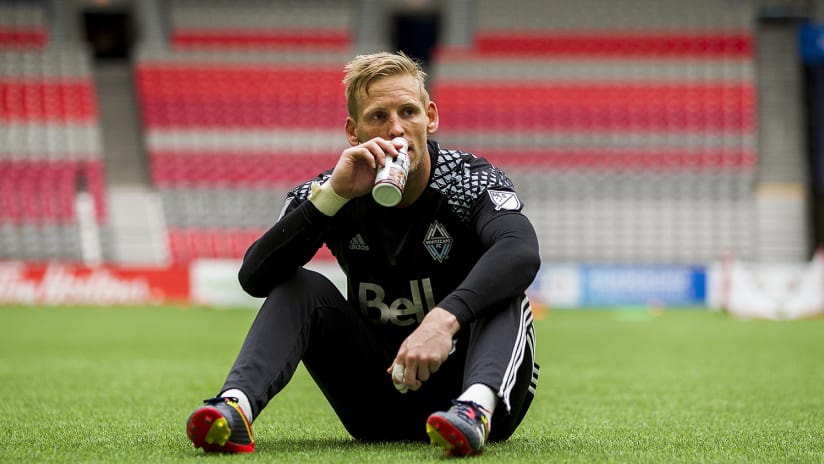We’ve all seen Michael Phelps’ monstrous 12,000-calorie diet.
Not all athletes ingest six times an average man’s daily calorie intake, however.
For Whitecaps FC players, it’s all about “matching their plates with their training.”
We sat down with club nutritionist Dana Lis, who gave us a rundown on the diet plan of a professional soccer player.
Wanna eat like the ‘Caps? Get with the program below.
But first, coffee
Like the rest of us, the ‘Caps may need a jolt first thing in the morning. For the team’s coffee-drinkers, caffeine is “a tried and tested ergogenic aid,” that can be a necessary morning pick-me-up or used strategically in games.
Fueling up
Some players opt for lighter breakfasts, to ensure they’ve digested properly before they start training. “Starchy carbohydrates like oatmeal is a go-to, with high-antioxidant fruits, and high-quality protein like Muscle MLK or Greek yogurt.”
Revving the engine
Depending on the volume and intensity of the day’s on-field training, the ‘Caps may opt for a pre-session top-up that provides more carbohydrate availability, “like a piece of fruit, or a sip of a sports drink as they’re getting ready – something that’s easy to digest, anywhere from an hour to 20 minutes before getting on the pitch.”
Post-training
Training usually finishes just before noon, followed by lunch. Must-haves are high-quality protein, plus carbohydrates to replenish glycogen storage, and foods high in antioxidants, like vegetables and fruits. If they’re meat-eaters, red meat is recommended. Maybe not as much as Ron Swanson would prefer, but at least twice a week to ensure a better absorbed source of iron in their diet. “There are light, moderate, or heavy training days, and their plates are supposed to match that.”
Cheat days
Treats once every few days is fine. Hold the drizzle and the whipped though. “Something a little healthier like a fruit crisp or a zucchini bread, rather than chocolate cake or ice cream.”
Making gains
On days that the players do strength training, recovery smoothies are a popular post-workout reward. “That’s usually the time we like to use the whey-based protein, which you can also get in the Muscle MLK product. The whey-based protein is absorbed fairly quickly so it helps with muscle synthesis better than a soy- or vegetable-based product.”
Dinner
Think ‘Caps players are done building their bodies once they head home for the day? Think again. “Athletes looking to maximize overnight muscle synthesis, I suggest a casein-based protein before bed like Greek yogurt, cottage cheese, or milk.”
Injury prevention
An up-and-coming potential secret to making stronger tendons and decreasing risk of the dreaded ACL injury? Eat more Jello. “Gelatin supplementation is something players will start to use to prevent tendon stiffness and rate of force production. Soccer relies on a lot of quick movements, and when you need a quick rate of force development, strong and stiff tendons are helpful. The amino acids that are in high concentration in gelatin are major building blocks of collagen, which makes up tendons. If you take gelatin an hour before activity, you’re able to move faster and quicker."
Dana is a well-known sport dietitian with broad experience at the Professional, Olympic, National and International levels. Her passion for high performance sport nutrition has provided her the honour of working with world-class athletes, and helping them to achieve top performances. With a competitive background in figure skating and road cycling, Dana knows what it takes to maximize performance nutrition, and has helped athletes win Olympic medals at London 2012 and Sochi 2014. As a registered dietitian and graduate of the renowned IOC diploma in sport nutrition, she is currently completing her PhD research, investigating the effects of gluten-free and acute low FODMAPs diets on gastrointestinal health and inflammation in endurance athletes.
For more information on Muscle MLK, visit their website at MuscleMLK.ca.



